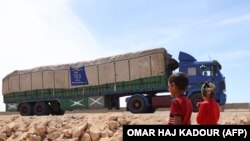On December 9, just one day before the global observance of Human Rights Day, the United Nations passed a binding resolution that established a carve-out across UN sanctions regimes to facilitate the delivery of humanitarian assistance in areas under the control of designated individuals and entities or with substantial populations of individuals affiliated with designated groups. The resolution was co-drafted by the United States and Ireland, with 53 countries joining as co-sponsors.
“This is a win for people in need everywhere, humanitarian aid workers trying to reach them as well,” said U.S. Ambassador to the United Nations Linda Thomas-Greenfield. “Sanctions are an important tool in our arsenal. They help us constrain bad actors without resorting to violence. To stop terrorists and human rights abusers. At the same time, we hear from the humanitarian community that some UN sanctions are having second-order impacts. They unintentionally make aid more difficult to deliver.”
To mitigate such unintended effects, the United States has supported humanitarian exemptions within individual U.N. sanctions regimes. The humanitarian community applauded these efforts as “incredibly helpful”, but continued to point out the need to create a single, standard carve-out of humanitarian assistance from UN sanctions regimes.
“Today, we delivered on that request,” said Ambassador Thomas-Greenfield. “In unambiguous language, we have exempted critical humanitarian activities from UN sanctions, and in doing so, we have also made our existing UN sanctions more effective and better targeted toward bad actors.”
“Speed saves lives. Humanitarians need to act fast to get medicines to a community in need, to get a roof over the heads of freezing people, and to get food to starving children,” she said. “Now...when the funds are there, and the humanitarian actors are ready, they can spring into action. They can and will save more lives – all around the globe. And that is something we can all be proud of.”
“This Resolution includes safeguards to protect against abuse and evasion by sanctioned persons and entities, including by establishing reporting requirements to ensure detection and mitigation of possible aid diversion,” said Secretary of State Antony Blinken in a written statement.
“By providing exceptions for humanitarian activities across UN sanctions regimes, the Resolution provides much-needed clarity to the international community, humanitarian assistance providers, and critical commercial service providers, which will help facilitate the delivery of aid and goods that are critical to saving lives around the world.”






